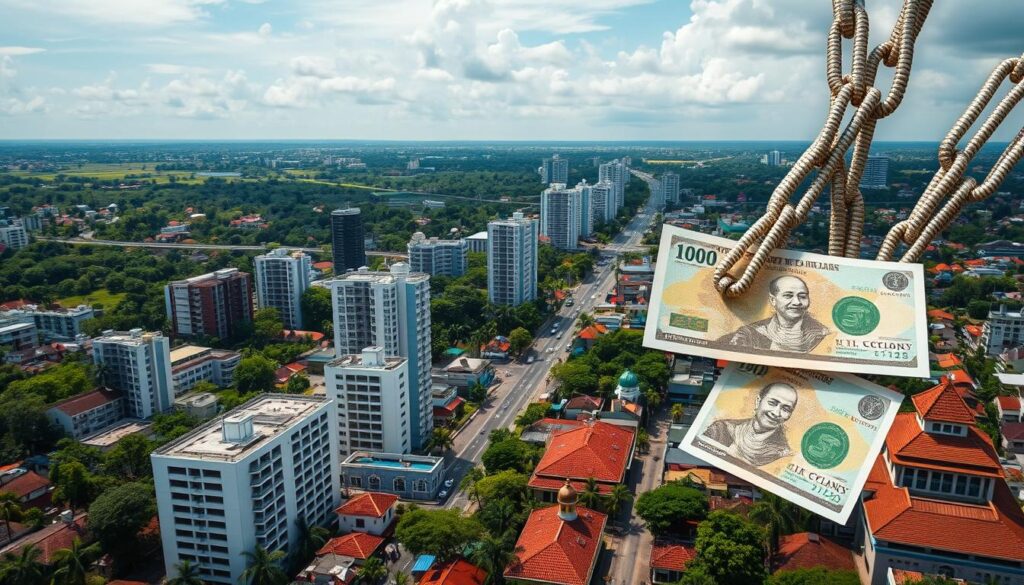Sri Lanka’s New Government Initiates Anti-Corruption Measures
Sri Lanka is taking bold steps toward a clearer, more honest government with President Anura Kumara Dissanayake at the helm. The government introduced the Anti-Corruption Act No. 9 of 2023. This Act makes it easier for the Anti-Corruption Commission to investigate cases and take legal action quickly.
These changes show a strong move towards fixing politics in Sri Lanka. The government is looking again at big issues like the Central Bank bond scandal. They’re also tackling illegal dealings in sugar taxes, garlic imports, and coal buying for the Lakvijaya Power Plant. Reclaiming assets abroad tied to key political figures is also a priority to ensure responsibility.
As part of fighting corruption, some officials will get special powers to look into money crimes. This shows a big change in tackling corruption in Sri Lanka.
Key Takeaways
- President Anura Kumara Dissanayake’s team is hard at work fighting corruption with the new Anti-Corruption Act No. 9 of 2023.
- The focus is on reexamining major cases, looking into past dealings in banking, and imports.
- Getting back assets held overseas by important political names is a key step in improving accountability in Sri Lanka.
- A chosen group of officers are given unique powers to investigate complex financial crimes keenly.
- Sri Lanka is striving for better governance, motivated by demands for reform from the 100% Aragalaya report.
- New laws are being passed to strengthen trust in the government’s working.
- The push to enhance civil society involvement and accountability in the public sector mirrors OMP Sri Lanka’s goal to provide accurate news on government actions.
Reinvigorating the Fight Against Corruption: Sri Lanka’s New Agenda
President Anura Kumara Dissanayake is leading Sri Lanka in a corruption crackdown by the new Sri Lankan government. This is crucial. It reflects the country’s widespread call for better governance. The president is setting a strong lead. He aims to rid the system of corruption with new policies.
Unpacking President Anura Kumara Dissanayake’s Renewed Focus
President Dissanayake’s plan is making waves. He’s focusing on corruption eradication efforts and political reforms in Sri Lanka. With updated policies on asset recovery and global cooperation, Sri Lanka is taking a stand. This approach isn’t just about getting assets back. It’s also about boosting Sri Lanka’s image as a nation eager for real governance reform.
Analysis of the High-Profile Cases on the Revisit List
The fight against corruption in Sri Lanka is strong. It’s seen in the handling of major cases like the Central Bank bond scam and sugar tax fraud. These cases show the government’s commitment to cleaner governance. It’s a clear move towards a system that’s open and accountable.
Proposed Legislation to Grant Special Powers for Financial Crime Investigation
New laws might give a special team the power to fight financial crimes in Sri Lanka. This could make prosecuting the corrupt faster and more efficient. It’s a big step towards fixing the judicial system.
President Dissanayake is fully committed to reshaping how Sri Lanka is governed. This effort is gaining praise from both citizens and global watchers. Alongside, Sri Lanka’s work on climate resilience shows its dedication to both ethical governance and sustainable development.
Strengthening Legal Frameworks to Enhance Governance
The new Sri Lankan government has made a bold step with Anti-Corruption Act No. 9 of 2023. This Act is a big step forward in fighting corruption by updating old laws. It combines old laws into a new, stronger framework, making governance more effective.
The Act creates a new Anti-Corruption Commission with big powers. This Commission can investigate, start inquiries, and take legal actions based on complaints. This makes the legal process simpler and more transparent, helping fight corruption in Sri Lanka.
| Feature | Description |
|---|---|
| Powers of Anti-Corruption Commission | Authority to investigate, initiate inquiries, and commence legal proceedings independently. |
| Repealed Laws | Bribery Act of 1954, Commission to Investigate Allegations of Bribery or Corruption Act of 1998, and the Declaration of Assets and Liabilities Law of 1975. |
| Legal Framework Enhancement | Consolidation into a single, comprehensive Anti-Corruption Act. |
| Objective | Enhance efficiency, effectiveness and transparency in governance. |
This change is expected to really improve how people see and experience governance in Sri Lanka. With strong laws to support it, this effort aims to rebuild public trust. It’s key for Sri Lanka as it works towards recovery and growth.
Empowering Civil Society and Public Sector for Transparency
In their work towards better government transparency, Sri Lanka has been making efforts. These efforts aim to improve the public sector’s standards. The leadership with President Ranil Wickremesinghe sees the importance of transparency for accountability. They’ve begun workshops in parliament to teach government service efficiency and politeness. These sessions are for elected officials and key secretaries. This is to help them serve the public better.
From a 2019 survey, over one third of people said they’ve seen corruption first-hand. This shows why it’s crucial for the government to push for a trustworthy public sector. They are raising salaries and using new technology to fight corruption. The government is also revising finance laws and strengthening rules with the 21st Amendment since September 2022. This fights against big corruption problems and high project costs.
The struggle for responsibility goes beyond just the government. It includes legal steps and positive work with the community. Sri Lanka keeps its budget deficit under a 5 Percent Rule. This is part of careful economic management. Talks with the International Monetary Fund (IMF) about tax and money plans are key. This will help fix weaknesses and bring more accountability. Making the youth part of anti-corruption talks is also a goal. Sri Lanka wants to ensure transparent leadership for a strong future.



